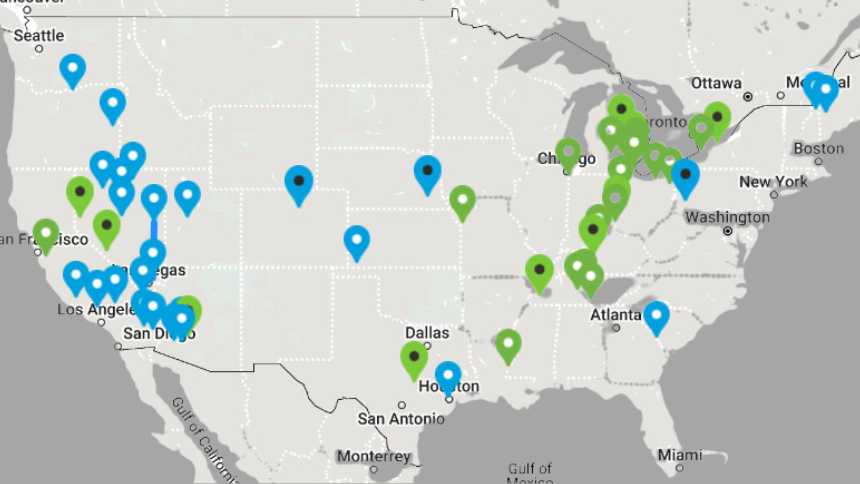
A Chattanooga-based firm helps others navigate the DOE loan application process
Energy Transition Finance LLC is one of three business units under the Emerald Operating Partners umbrella.
Michael Walton has a deep passion for clean energy technologies and, as Managing Partner of Energy Transition Finance LLC (ETF), he is helping the firm’s clients navigate the daunting process of applying for U.S. Department of Energy (DOE) loans.
ETF is a strategic advisory firm co-founded by Paul Browning, former Chief Executive Officer (CEO) of Mitsubishi Power Americas, and Lawrence Quinn, Managing Partner at Emerald Operating Partners. The boutique firm operates as one of three business units under the Emerald umbrella. It held the official grand opening of its new office in Chattanooga on November 9, an event that was characterized as “a pivotal step in the company’s expansion strategy in the United States.”
Walton, who is a native of Greeneville, TN, graduated from the University of Tennessee, Knoxville with a Bachelor of Architecture degree in 2007 and took his first job with a sustainable design firm in Washington, DC. Nearly seven years later, he returned to the Volunteer State – this time in Chattanooga – where he served for the next nine and one-half years as CEO of green|spaces before joining Emerald Operating Partners at the beginning of 2022 and helping launch ETF 18 months later.
Now, 17 years after graduating from college, the architect turned strategic advisor is helping his clients get past the challenges of integrating new technologies into their businesses with an emphasis on those in the clean energy sector.
“It’s not a matter of how good an idea is,” Walton says, adding, “They are not going to be successful without funding.”
ETF contracts with applicants who are seeking funding through the DOE Loan Programs Office (LPO), providing services that help them structure an energy transition project, complete the LPO loan guarantee process, arrange debt and equity, and achieve financial close. (EDITOR’S NOTE: The featured image shows the projects funded by the LPO.)
“Our advisory services include all aspects of turning a high-level conceptual idea into a structured agreement that reaches a financial close,” ETF explains on its website. “This includes concepts such as off-take agreements, risk apportionment between contracting parties, commercial architecture, equity syndication, contracting with EPCs (engineering, procurement, and construction) and OEMs (original equipment manufacturers), and operational, commercial, and developmental due diligence. Energy Transition Finance also has a deep understanding of the “Bipartisan Infrastructure Law,” the “Inflation Reduction Act,” and other U.S. government programs and how they impact an application to the DOE LPO through the Title 17 Clean Energy Finance Program, the Advanced Technology Vehicles Manufacturing Loan Program, the Tribal Energy Loan Guarantee Program, and other related programs.”
Walton explains that there are three kinds of advisors in the sector: law firms, lobbying firms, and grant writers.
“We bring a completely different skillset,” he says. “We are focused on operating and growing sustainable businesses across the technology spectrum. We are not a McKinsey that comes in and tells you how to do it. We bring surge capacity to help you do it.”
Walton adds that ETF is best positioned to help businesses through the three Valleys of Death. Perhaps the client company has a proof on concept but needs funding from angel or venture capital or various DOE programs to advance the technology. Maybe the company needs help with commercialization or a demonstration project that requires it to secure a partner. Then, there are the growth and exit strategies.
As an example of the scope and quality of work that ETF does, Walton cites the ACES Delta project in Utah where Mitsubishi Power Americas and Magnum Development are developing a large renewable energy hub to produce, store, and deliver green hydrogen to the Western United States. In June 2022, the partners received a $504.4 million loan guarantee from DOE’s LPO. Chevron U.S.A. Inc., through its Chevron New Energies division, acquired Magnum Development in mid-2023.
ETF has also launched an innovative Application Assessment Tool, designed to streamline and enhance the application process for the DOE LPO. The new free tool will allow ETF to help emerging clean tech companies catalyze their applications for funding allowing them to grow, scale, and succeed in advancing clean energy solutions to the climate crisis.
Specifically, the tool allows applicants to evaluate their eligibility and readiness for DOE LPO funding, providing a clear pathway and tailored guidance for successful applications. The tool’s user-friendly interface enables efficient navigation through the complexities of the application process, further solidifying ETF’s position as a leading advisory partner for clean energy and decarbonization projects.
While working with companies submitting applications to the DOE loan program is a key focus area for ETF, Walton says the firm has had “a lot of success beyond LPOs.”
Like what you've read?
Forward to a friend!

